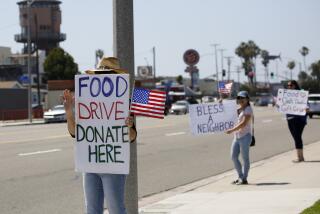The Least of These Our Brethren
It’s Christmastime, the one season in this increasingly Scroogey land when one may advocate generosity to the poor. I’m not sure where the idea of year-round generosity went. It’s well entrenched in the Bible, especially in the teachings of him whose birthday we are allegedly celebrating. He hung out with the poor. He spoke for them. He urged us to lay up treasure not on earth but in heaven.
But, then, he was a raving liberal. Christmas, we are told by our leaders, is for buying, eating, drinking and pumping up the economy. The poor are there to receive our annual beneficence, so we can feel good about ourselves and get tax deductions. For the rest of the year we tell them to go get jobs.
Item: Government programs for the poor constitute one-fourth of nondefense spending but have absorbed more than half of recent budget cuts. These cuts were deemed necessary to reduce deficits caused by tax cuts for the rich. In the 1980s the real income of the top fifth of Americans rose 32% while their federal tax rate dropped 5.5%. The bottom fifth saw an income rise of 3% and a tax increase of 16%.
I believe there is a real moral majority in this country that is alarmed by the widening gap between the rich and the poor. We know that the scriptures of all religions warn against too much wealth or poverty. “Give me neither poverty nor riches, but give me only my daily bread, otherwise I may have too much and disown you and say, ‘Who is the Lord?’ Or I may become poor and steal and so dishonor the name of my God.” (Proverbs 30)
Item: The 1960 after-tax average pay for CEOs was 12 times that of the average worker. By 1974 it was 35 times. In 1995 it was 135 times. That’s the ratio of the top to the average, not to the bottom, and it counts only salaries, not perks or returns to investment.
The moral majority is silenced by the politicians, the corporate leaders, the loud and savvy, who have developed many clever ways to scoff at the compassionate. Magnified by microphones and satellite beams, they perpetuate new scriptures, which assert that the rich deserve every penny they accumulate and the poor deserve despair.
The Bible quotes and some of the statistics I cite come from a new book by that most far-seeing and heretical of economists, Herman Daly (“Beyond Growth,” Beacon Press, 1996). For 25 years now, Daly has been thinking through a new economics that accounts for the wealth of nature, the value of community and the necessity for morality. One chapter in Daly’s book has to do with limiting economic inequality.
Item: Mattel CEO John Amerman was paid $7 million in 1995--the aggregate amount earned by his 11,000 workers in China who get 25 cents an hour to mold plastic Barbie dolls. That doesn’t count Amerman’s $23 million in stock options, which exceeds the combined income of his Indonesian Barbie assemblers. Each of them would have to work 28 years to earn what Amerman earns in a day.
Daly advocates a minimum and maximum income for everyone. The minimum should allow “some culturally defined amount sufficient for food, clothing, shelter and basic health and education.” The maximum should be set at a simple multiple of the minimum--Daly suggests 10 times, but is willing to go up to 20. That range allows reward for excellence and enticement for entrepreneurism without tearing apart community. Anyone who feels the need for more probably actually needs esteem, not money. Esteem could be earned honestly by good works, rather than falsely by conspicuous consumption. Compassion could once again become a publicly admired virtue.
Daly’s idea is unthinkable, unmentionable, anti-capitalist, disruptive. It will never be discussed seriously in public by those who need enormous amounts of money and attention to know who they are. But maybe just now at Christmastime I can admit that I’d rather live in a society with a limited range of inequality. I don’t need moral reasons--I need only worry about what happens to children who grow up poorly educated with no health care, no self-worth, no hope. They are supposed to become loyal workers, good customers, informed citizens, good parents and keepers of the peace. I just don’t think that can work.
The moral majority can easily see what the desperate rich seem to lose sight of. In the long run, on the large scale, and all year round, morality and practicality flow together.


